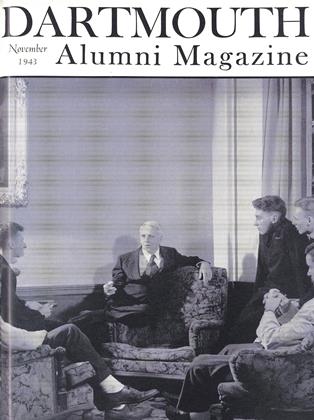SELDOM IN A HISTORY of any sort can a pinpoint of time be designated as the exact beginning of a new era or period of development. In the growth of Dartmouth College, however, the date June 28, 1893 can be claimed as such a precise starting point, for on that day, fifty years ago, William Jewett Tucker became President of the College and "modern Dartmouth" began.
Recently a member of the class of 1864, while visiting Hanover, spoke of Dr. Tucker with the reverence and love which Dartmouth men of that day universally felt towards him, and he particularly recalled the electrifying effect upon the atmosphere of the College when the new President began his administration and gave the first of his famous chapel talks to the undergraduates. Dartmouth was virtually reborn under the leadership of this wise and good man, whose presidency, in its spiritual aspects and in its promise for today and for the future, is the subject of our lead article in commemoration of the fiftieth anniversary of the start of President Tucker's administration.
As Professor L. B. Richardson states in his history of the College, Dr. Tucker raised Dartmouth from an institution largely of the 18th century to one of the 20th century. Controversy and factionalism, so predominantly the story of Dartmouth up to his time, were swept away in the new spirit of unity which he brought to the College. Many of the strengths possessed by Dartmouth today are the fruits of far-sighted plantings by Dr. Tucker a half-century ago.
PARADOXICALLY, the sixteen years of President Tucker's administration were marked by a development of material resources and a grasp of organization hardly to be expected of a minister and professor of theology. With vision, boldness, and complete faith in the destiny of Dartmouth and of the liberal arts college in American higher education, he urged upon a somewhat hesitant Board of Trustees a policy of "natural growth" and expansion. Enrollment rose from 458 to 1,233, faculty from 49 to 98. Modern buildings went up, those of an income-producing nature financed by the unheard-of utilization of the College's own endowment funds. The first graduate school of business administration in the country was established, the social sciences were accorded an important place in the curriculum, the elective system was developed.
In his conception of the role of the alumni in College affairs Dr. Tucker made one of his most important contributions to modern Dartmouth. The alumni he viewed as an integral and indispensable part of the whole College, and he was indefatigable in carrying an account of the growing institution to them. What the financial support of the alumni could mean to Dartmouth was fully understood by Dr. Tucker, but he preferred to have this come of its own accord and he was wisely certain that such support would naturally follow once the alumni felt themselves a continuing part of the College and understood its aims and problems. Dartmouth's present leadership in alumni organization, its Alumni Fund, Dartmouth Night, the Secretaries Association, this MAGAZINE, all are the outcome of President Tucker's then uncommon view of the place of an alumni body in the life of a college.
IN THESE MANY WAYS, and in still others, Dr. Tucker determined in broad outline the Dartmouth of today and perhaps of the future. President Hopkins, who modestly describes his own administration as a continuation of the policies learned under Dr. Tucker, defined this influence upon the present in a tribute delivered shortly after President Tucker's death in 1926:
He believed in the importance of Dartmouth College to society and he believed in its individual distinction. Thus it came about that to the greatheritage which was already Dartmouth's were added those qualities which inhered in him., enlivened and stimulated all they touched. To the many facets ofDartmouth's life was added that bright and flashing one which reflected andreflects from the College the qualities of his own spiritual and intellectual self.The College of today cannot be explained, nor indeed understood, except asone has some knowledge of the qualities which were his.
 View Full Issue
View Full Issue
More From This Issue
-
 Article
ArticleROBERT FROST RETURNS
November 1943 By CHARLES G. BOLTE '41 -
 Article
ArticleWILLIAM JEWETT TUCKER
November 1943 By ALEXANDER LAING '25 -
 Lettter from the Editor
Lettter from the EditorLetters from Dartmouth Men in the Armed Forces
November 1943 -
 Class Notes
Class Notes1918
November 1943 By ERNEST H. EARLEY, DONALD L. BARR -
 Class Notes
Class Notes1937
November 1943 By JOHN H. DEVLIN JR., FRANCIS T. FENN, JR. -
 Class Notes
Class Notes1917
November 1943 By MOTT D. BROWN JR., DONALD BROOKS
C. E. W.
Article
-
 Article
ArticleMasthead
May, 1923 -
 Article
ArticleI Found Seven Latinos
May 1940 -
 Article
ArticleDay(s) in court
DECEMBER 1984 -
 Article
ArticleQuirkiness to Taste
December 1980 By Dana Cook Grossman -
 Article
ArticleYale 10, Dartmouth 6
DECEMBER 1963 By DAVE ORR '57 -
 Article
ArticleNow When I Was in College About Twenty-Five Tears Ago
January 1933 By Hap Hinman '10







